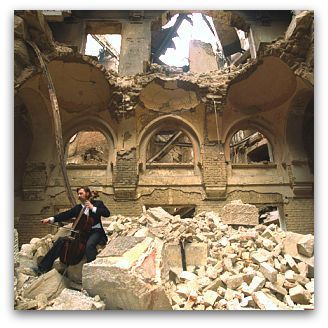In a scripture class, taught and attended by women in my stake, I was recently asked to read a story written by Paul Sullivan, published in the Reader’s Digest in 1996, about the Cellist of Sarajevo.
The setting was Bosnia, 1992, two months into the Bosnian war that killed over 100,000 people and proved to be the most devastating conflict in Europe since the end of World War II. Before the war, thirty-five year old Vedran Smailovic had been a cellist for the Sarajevo Opera – a distinguished career to which he longed to return.
On May 27th of that year, not far from Smailovic’s apartment, a small bakery, one of the few that still had a supply of flour, was distributing bread to a long line of starving patrons. At 4 P.M. a mortar shell fell directly into the middle of the line, killing 22 people and splattering flesh, blood, bone, and rubble. Sullivan writes,
When [Smailovic] saw the carnage from the massacre outside his window, he was pushed past his capacity to absorb and endure any more. Anguished, he resolved to do the thing he did best: make music. Public music, daring music, music on a battlefield.
For each of the next 22 days, at 4 P.M., Smailovic put on his full, formal concert attire, took up his cello, and walked out of his apartment into the midst of the battle raging around him. Placing a plastic chair beside the crater that the shell had made, he played in memory of the dead Albinoni’s Adagio in G minor, one of the most mournful and haunting pieces in the classical repertoire.
He played to the abandoned streets, smashed trucks, and burning buildings, and to the terrified people who hid in the cellars while the bombs dropped and bullets flew. With masonry exploding around him, he made his unimaginably courageous stand for human dignity, for those lost to war, for civilization, for compassion, and for peace. Though the shellings went on, he was never hurt.
Smailovic’s brave stand stirred me profoundly. He showed complete control in the face of darkness. I imagined how I might have felt had I been walking a nearby street, stepping over the insufferable devastation of ethnic cleansing, when the strain of his expert bow on strings floated into my ears.
Nancy Baird, the teacher for our class, arranged to have Michelle Ferry, a cellist from the Orchestra at Temple Square, and Nancy’s daughter, Kara Carlston, play Albinoni’s Adagaio in G Minor, right there in our chapel. The music was indeed haunting. It was mournful, emotive, and it bored a hole right through me.
I felt as if my insides would ignite for the longing I felt to defend all that is good. When they finished playing, a solemn reverence hung in the air. Nancy said, “Surely this is what it means to be civilized…to stand for the sacredness of life in the face of bombs…to step into a river of light that includes order and freedom to act.” (Listen to Michelle and Kara play Albinoni’s Adagio by advancing the audio to 46:00.)
I have thought for several days now about the need to preserve civilization in our nations, our cities, and where we can probably teach it best, in our homes. The terrifying blow of mortar shells may not sound in our streets, but there is still a need to stand for the civilized way. To intervene anywhere human life is devalued.
Nancy taught that civilization is comprised of two elements. Order (Moroni 9:18) and freedom. God has always intended us to live with order, to have a structure in place, laws to follow, parameters. But He has also given us freedom – that unmatchable gift we ought to give each other – particularly our children, our family, and our friends.
Since Nancy’s lesson I have felt the need to be more civilized in my home. To model civility when my children are anything but civil with each other, to stand firm and unruffled despite the chaos around me. To allow them choice and freedom whenever possible. It is not easy. But how else will my children come to understand this higher way of living?
Those two words, order and freedom, ought to undergird my actions more. I cannot think of a better way to live life or run a home. When freedom hovers over order, we are able to act with love, make beautiful music, and step, as Nancy said, into a river of light.
What do you think it means to be civilized? Has a certain piece of music stirred you in a similar way? Have you made a big or small stand for civility recently? If so, what was your experience?
Photo of Vedran Smailovic playing in the ruins of the National Library in Sarajevo (1992) by Mikhail Evstafiev
Related posts:
Continue reading at the original source →




